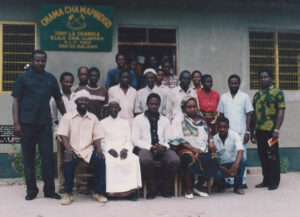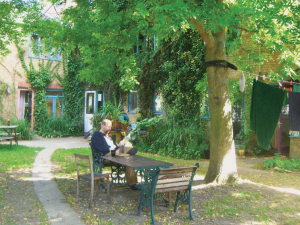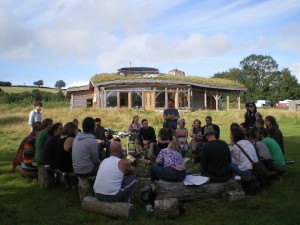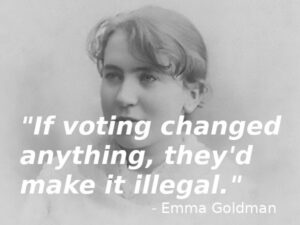‘The Tyranny of Structurelessness’: some thoughts

The Tyranny of Structurelessness is a seminal essay by Joreen Freeman (above), written in 1970. I read it for the first time recently, but I’ve known about it for many years, and in fact, I lived in an intentional community where it was regularly mentioned, and at least some of us lived by its main principle.
That main principle is that to achieve their aims, groups and organisations need a formal structure. That may sound a bit rigid, ‘unfree’ and unspontaneous – a bit corporate, if you like, but I believe it’s nevertheless true. It may be why the corporate sector is doing so well – is in total control of the global economy in fact. But formal structure doesn’t have to be hierarchical like the corporate sector – doesn’t have to be ‘command and control’.
Lack of formal structure will always lead to informal structure
Freeman was a feminist organiser back in the 60s, but now that feminism has won, and women have gained absolute equality (just joking, Jo), her essay can be applied to any kind of organisation – a housing co-op, an envrionmental, political or campaign organisation, or even (or maybe especially) an anarchist group. Her point was that if a group has no formal structure, some people will seize the opportunity to take de facto power.
In fact she argues that there is no such thing as structurelessness at all – if there’s no formal structure, an informal structure will develop, and insiders who understand the informal structure will use it to get their way. Others might not even know it’s happening, and be blissfully unaware of the existence of any informal structure. But there will always be one. The only way to prevent this from happening is to have a formal structure that is transparent and democratic. Otherwise, secretive informal ‘clubs’ develop that hold real power, as in our political systems, with old boy / school tie networks, Masons, Bullingdon / Bildeberg members, TTIP negotiations etc.
Formal structure doesn’t necessarily mean having leaders
However (and this is a very important point), formal structure doesn’t necessarily mean leaders within individual groups. It could just mean co-ordination within and/or between co-operative or leaderless groups. The community I lived at was founded in 1978 and is still going strong. I believe the secret of its longevity is its adherence to Freeman’s principle – even if most members had never heard of her. We had legally-binding external co-operative rules, but also internal rules that had developed over the years to facilitate the smooth running of a community of, on average, around 15 adults and 10 kids – no easy task. But we didn’t have a leader. Delivery drivers would often ask what kind of place it was, and who was in charge. When told ‘all of us’ they had a problem getting their head around it. And I had a problem getting my head around why they couldn’t get their head around it. I’ve only had a boss for very short periods of my life, and it will never happen again.
Imagine a network of such places, including worker and housing co-ops, community energy and community-supported agriculture groups, credit unions etc. The nature of these co-operative enterprises is that no-one is ‘in charge’. But then, to co-ordinate at the larger scale, it’s probably going to need representatives (or delegates) of these groups to come together to plan wider change and co-ordination. It’s difficult to see how these delegates would be charged with never making executive decisions. In the end, it doesn’t matter whether a group has ‘leaders’ or not – what’s important is that the structures are formal, transparent and democratic.
Joreen puts it well:
If the movement continues deliberately to not select who shall exercise power, it does not thereby abolish power. All it does is abdicate the right to demand that those who do exercise power and influence be responsible for it. If the movement continues to keep power as diffuse as possible because it knows it cannot demand responsibility from those who have it, it does prevent any group or person from totally dominating. But it simultaneously insures that the movement is as ineffective as possible. Some middle ground between domination and ineffectiveness can and must be found.
But we do have to organise
Joreen goes on to opine that enough people have had their consciousness raised now, and it’s time to act, and I completely agree (she was talking about sexism; I’m talking about corporate power, but it still applies):
The movement must go on to other tasks. It now needs to establish its priorities, articulate its goals, and pursue its objectives in a coordinated fashion. To do this it must get organized — locally, regionally, and nationally.
And more importantly, in my opinion, globally. Joreen was writing in the pre-internet era, remember.
If you think corporate capitalism is a good idea, well of course you will understand the need for formal structure. You’ll just do as you’re told, make as much money as you can and don’t think about it too much. You might lean more towards libertarianism / laissez faire capitalism (which means you certainly don’t want to be told what to do by a state bureaucrat, but a boss is OK), or you might be on the ‘compassionate conservative’ side of things. But you still won’t have a problem with formal structure in the way that some opponents of corporate capitalism do.
Opposition to corporate power is unstructured. I’ve been trying to suggest to everyone I can think of working to build an alternative to corporate power (the ‘rebel network’?), that maybe we need to be more structured, more co-ordinated. Joreen says this about any plans to challenge power at the global level if we are not co-ordinated:
Insofar as they can be applied individually they may be acted on; insofar as they require coordinated political power to be implemented, they will not be.
Structure / co-ordination is what we need if our victories are not going to remain tiny. As Joreen says, lack of structure doesn’t mean that ideas and concepts (such as global democracy and sustainability) are not talked about – just that nothing significant happens. And so we have a situation where there are ever more groups and organisations forming that are talking about creating a better society, and yet each year humanity’s global footprint gets bigger (it’s already bigger than one planet – which is suicidal – and growing) and the corporate grip on the global economy gets stronger. Those two things are intimately connected, of course.
Below is a link to the original essay – enjoy.
The views expressed in our blog are those of the author and not necessarily lowimpact.org's




 Want to experience what life is like in an intentional community?
Want to experience what life is like in an intentional community?
 What is human nature? Are we really a horrible species?
What is human nature? Are we really a horrible species?
 How Julius Nyerere’s Ujamaa idea could form the basis of a new global political system
How Julius Nyerere’s Ujamaa idea could form the basis of a new global political system
 Mutualism: a philosophy for changing society with a difference – it’s implementable
Mutualism: a philosophy for changing society with a difference – it’s implementable
 Co-operatives
Co-operatives
 Community
Community
 Housing co-operatives
Housing co-operatives
 Intentional communities
Intentional communities
 Personal development
Personal development
 Philosophy
Philosophy
 The 'democracy problem'
The 'democracy problem'


